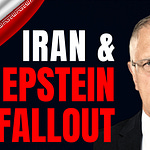Join Us in October for our Plan B Conference: https://www.crisisinvesting.com/p/the...
Doug and I kicked off our latest podcast discussing the meaning of Independence Day, noting how it means more ideologically today than in our youth, though we both criticized the current holiday as a celebration of state power rather than true independence.
We then turned to the newly passed "Big Beautiful Bill." While Doug confessed he had no intention of reading its 839 pages, I've begun to dig into it. Early findings include populist provisions cutting benefits for illegal immigrants and significant expansions in farm subsidies. Farmers now receive increased financial protection, did you know farmers can get paid even if they haven’t planted a crop - for years? This isn’t new to the bill, but it does increase the handouts they receive. I wrote an essay about it which should be published tomorrow.
I’m barely 1/3 the way through the bill, but it does contain some positives like locking in tax cuts, removing taxes on tips and overtime, and incentivizing capital investment by allowing immediate expense write-offs. However, it also expands defense spending significantly and, strangely, it allocates $1 billion explicitly for the president under the Defense Production Act, granting extraordinary interventionist economic powers, a clear example of top-down industrial policy and creeping fascism.
On other topics:
Doug emphasized short sellers' important market role, despite controversy around practices like naked short selling.
Ukraine remains a tragic mess, propped up unnecessarily by Western money and arms, prolonging suffering. Doug sees potential for continued instability, especially if Putin miscalculates.
Chemtrails and weather modification intrigued us. Although skeptical, Doug recognized the historical and commercial reality of weather modification practices, and I highlighted observable evidence, though no firm conclusions.
On geopolitical moves, Doug criticized NATO as useless and outdated, derided Japanese corporate expansion into the US as driven by demographic collapse at home, and was wary of Bolivia's instability, especially due to cultural and racial divides.
Finally, we considered private versus state militaries. Doug categorized militaries into draftees, mercenaries, and militias, strongly preferring militia-style defenses limited to protecting one's home rather than engaging in foreign adventures.
We wrapped up agreeing on the importance of storytelling and ideological alignment for writers contributing to our newsletters, especially highlighting potential interest in market-neutral short-selling strategies.
00:00 Introduction and Independence Day Reflections
00:22 The Significance of the Declaration of Independence
01:42 Critique of Modern 4th of July Celebrations
03:01 Discussion on Trump's Big Beautiful Bill
04:20 Farm Subsidies and Agricultural Policies
10:02 Defense Spending and Industrial Policy
17:03 Citizenship by Investment in Sierra Leone
19:08 Opinions on JP Morgan Funds and Short Selling
25:15 Ukraine Conflict and Global Implications
28:40 Chemtrails and Relocation to Paraguay
29:30 Chemtrails and Weather Modification
30:07 Skepticism and Historical Context
31:02 Modern Weather Modification Practices
34:29 NATO and Political Dynamics
37:23 Insights on Writing and Market Analysis
43:18 Farming Analytics and High-Tech Agriculture
46:16 Bolivia's Political and Economic Landscape
48:06 Privatized Military and Eric Prince
50:18 Japan's Economic Moves and Demographic Challenges
54:17 Concluding Remarks and Future Plans










